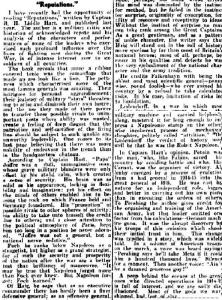Western Mail, Thursday, 12 December 1929, p. 2.
"Reputations."
I have recently had the opportunity of reading "Reputations," written by Captain B. H. Liddle Hart, and published last year. The author is a military critic and historian of acknowledged repute and his analysis of the characters and performances of some of the leaders who exercised such profound influence over the lives of fighting men during the Great War, is of intense interest now to ex-soldiers of all countries.
The book reveals that many a ribbon covered tunic was the camouflage that made an ass look like a lion. The pettiness which characterised some of the most famous generals was amazing. Their intrigues for personal aggrandisement; their jealousy of military "stars" threatening to arise and diminish their own lustre; and the use they made of their power to transfer these possible rivals to unimportant posts where ability was wasted, create a feeling of deep disgust that the patriotism and self-sacrifice of the firing line should be subject to such ignoble and unworthy leadership. One comes to its last page believing that there was more nobility of endeavour in the trench than in the headquarters' chateau.
According to Captain Hart, "Papa" Joffre was a dull, unimaginative man, whose grave military blunders were only offset by his stolid calm, which created a sense of security. His brain was as solid as his appearance, lacking in flexibility and imagination; yet his effect on the minds of others enabled him to become the rock on which France held and Germany foundered. His "promotion" of possible rivals to other spheres of activity; his ability to take unto himself the credit due to others; and a close, attention to the political atmosphere of Paris, kept him too long in a position be never adorned. "Joffre was not a general, but a national nerve sedative."
Foch he ranks below Napoleon as a stragetist, but higher as a grand strategist, for of such the security and prosperity of the nation after the war are a better test than brilliancy of manoeuvre, "It may be true that Napoleon forgot more than Foch ever knew. But Napoleon forgot; Foch learned."
Of Haig, he says that as an executive commander there has hardly been a finer defensive general; as an offensive general, none, perhaps, has made worse errors. His mind was dominated by the instinct for method, but he failed in the instinct for surprise, originality of conception, fertility of resource and receptivity to ideas. Without the instinct of surprise no man can take rank among the Great Captains. As a great gentleman, and as a pattern of noble character, the writer says that Haig will stand out in the roll of history more spotless by far than most of Britains national heroes; most of all, perhaps, because in his qualities and defects he was the very embodiment of the national character and the army tradition.
He credits Falkenhayn with being the ablest and most scientific general - penny wise, pound foolish - who ever ruined his country by a refusal to take calculated risks. In his case, limitation of risks led to liquidation.
Ludendorff, in a war in which most of the leaders were swept up by the military machine and carried helplessly along, mastered it for long enough to impress a Napoleonic stamp on the otherwise incoherent process of mechanical slaughter, politely called "attrition." "On Ludendorff the verdict of history may well be that he was the robot Napoleon."
In Captain Hart's opinion, Petain was the man, who, like Fabius, saved his country by avoiding battle and who, like Carnot, was the organiser of victory. Allenby emerged by a process of evolution; from a bad general in 1914-15 into the great general of 1918. He was cast by nature for an independent role, bigger and better in carrying out his own plans than in executing the orders of others. To Pershing the author gives credit for the organising and training of the American Army, but that leader omitted one factor from his calculations - German machine guns. It was the abrupt discovery by his troops of this omission which shook their initial trust in him. This change was typified in a story, which was widely told. In a column of American troops on the march, a voice was heard saying: "Pershing says he'll take Metz if it costs him a hundred thousand lives." Silence for a moment. Then another voice: "Ain't he a damned generous guy?"
A peep behind the scenes at the great ones who directed operations in 1914-18 is full of interest, and we are sadly disillusioned. Most of the gods we worshipped had feet of clay.








